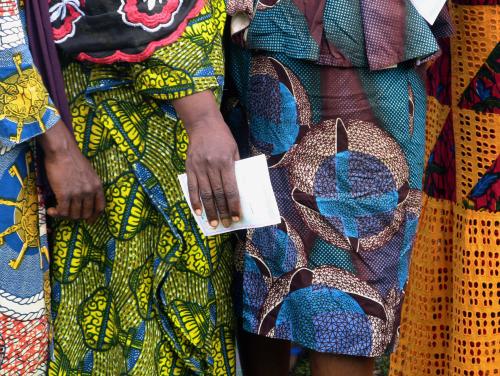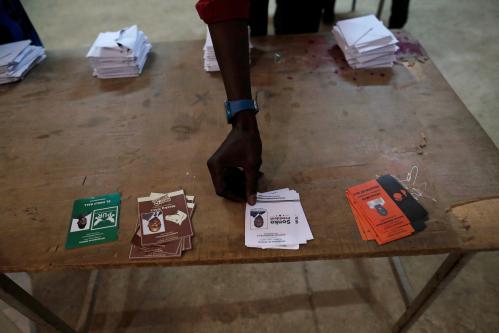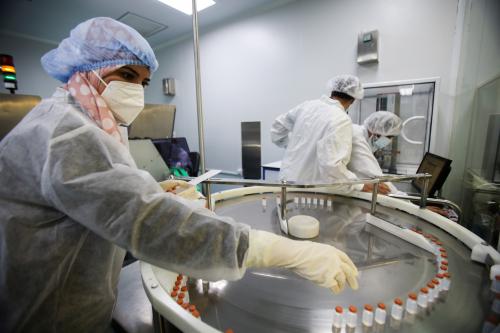Sudan remains embroiled in political disagreements over transition
Weeks after Sudanese President Omar al-Bashir was ousted from power, talks between the military and civilian protesters have stalled over the steps and makeup of the leadership transition process.
After months of protests over frustration with corruption, poor administration, human rights abuses, and rising food prices, Sudanese Minister of Defense Awad Mohammed Ahmed Ibn Auf announced on April 11 that al-Bashir would be stepping down after 30 years in power. Though protesters initially reacted to the news with celebration, their joy quickly transformed into frustration over the announced transition plan, which included rule by a two-year military transitional council.
Since the initial announcement and under continued protests and pressure from the Alliance for Freedom and Change, the military offered concessions to the protestors, including a joint civilian-military transitional council, though the two sides disagree over its composition. The military has proposed a council made up of seven military representatives and three civilians, while the protesters are pushing for eight civilians and seven military representatives. On Thursday, the Alliance for Freedom and Change led a “million-strong” march and sit-in of hundreds of thousands of protestors in Khartoum to present proposals for a civilian-led administrative council for governance.
On Friday morning, Lt. Gen. Salah Abdelkhalek announced that the military would not accept civilian majority on the transitional council.
Benin parliamentary elections held with no opposition candidates
Benin’s parliamentary elections were held on April 28 without opposition candidates after electoral authorities ruled last month that only two parties, both loyal to President Patrice Talon, met the requirements to participate.
Results were announced on May 1, with the Progressive Union party winning 47 parliamentary seats and the Republican Bloc winning the remaining 36. The elections had a record low turnout of just under 23 percent of the country’s 5 million registered voters. Opposition parties had asked their supporters to boycott the polls.
Prior to the election, internet access was restricted, and social media and messaging apps blocked. The government also banned protests, leading security forces to fire tear gas to disperse demonstrators. Rights activists have criticized the crackdown on peaceful protests as well as the arrests of Beninese political activists and journalists.
The unopposed election was the result of a new, more restrictive electoral code enacted by lawmakers from the ruling party earlier this year, changes Talon has defended, claiming that they would help bring together Benin’s more than 250 parties into simpler blocs. Critics argue that the new electoral rules are overly restrictive and bureaucratic.
Germany and the United Kingdom increase attention towards the tumultuous Sahel region and Nigeria
This week, Germany and the United Kingdom pledged increased aid following the rise of jihadist activity in West Africa’s turbulent Sahel region. During her five country West Africa tour, Chancellor Angela Merkel pledged millions of euros in renewed German aid. Germany has promised the G-5 Sahel group— consisting of Burkina Faso, Niger, Chad, Mali, and Mauritania—60 million euros, and an additional 20 million and 35 million euros to Burkina Faso and Niger, respectively. The aid will serve the dual purpose of fighting terrorism and supporting economic development, but details are still to be negotiated.
Britain is considering increasing its military presence helping the Nigerian government defeat Boko Haram, said U.K. Foreign Secretary Jeremy Hunt after his recent visit to the region. Secretary Hunt, who is worried the crisis could escalate to a humanitarian catastrophe like that in Yemen, is discussing how aid and military support from the British government can help combat the terrorist group. Britain currently provides 100 million euros in aid to the northeast region of Nigeria, where Boko Haram is most active.
The Brookings Institution is committed to quality, independence, and impact.
We are supported by a diverse array of funders. In line with our values and policies, each Brookings publication represents the sole views of its author(s).








Commentary
Africa in the news: Sudan, Benin, Nigeria, and Sahel updates
May 4, 2019